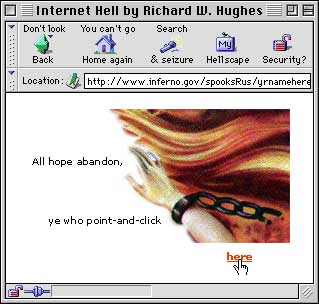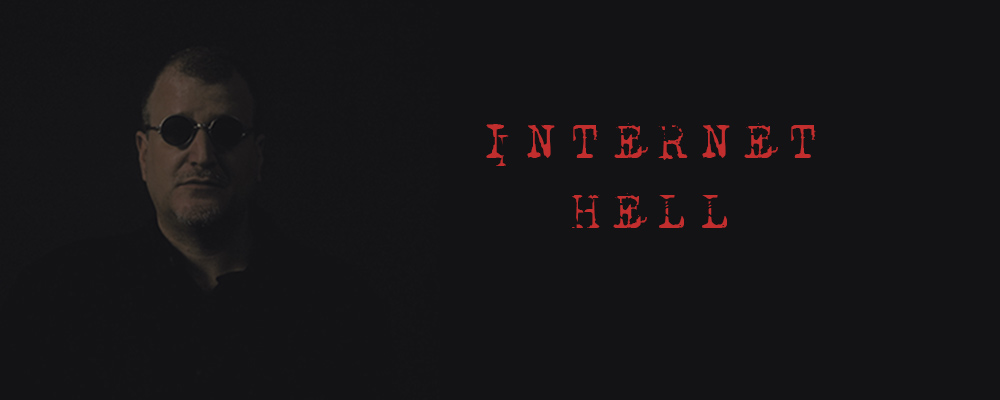Digital Devil #2. It took me a while to realize that the editor wanted me to write about gems.

Digital Devil #2 • Internet Hell
Webbed feet
Yikes! Is you shakin' in yo boots? You've read all about it and so have I. The internet menace, of course. Given the dangers of child porn, online gambling and the fact that, with that humble Macintosh in your basement, your 12-year old son now has the potential to hack into NORAD and bring the entire female western world to its knees with the threat of a tactical nuclear strike on Bill Clinton's pecker, I guess we should all be calling for some good old fashioned totalitarianism. Break out the Gestapo. Where is Joe Stalin in our hour of need? At the very least, a bit of the Mahathir "I-will-rule-forever/pray-to-me-or-I-will-lock-you-up-on-improper-sex-with-a-water-beetle" charges seems apropos. C'mon, baby, we gotta stomp that crap out right now, with a Shaquille O'Neal size 21 steel toe.
Deja vu
Ooo-eeee-oooo… Ever felt like you've been here before? Let's look at some of the previous menaces to Mom, religion, the flag, mango pie and the downfall of the human race. Just in my lifetime, it's been communism (ho hum), rock and roll music (yeah, yeah, yeah), television (nod), miniskirts (oo la la) and long hair (does anybody still remember the Lee Kwan Yew 'hippie-goat' forced haircuts at the Singapore border?). And that's not even including the Reagan presidency, which, in my youthful folly, appeared as serious a threat as any posed by the Soviets. Funny, despite all the above, the world has not come to an end. Life goes on.
Scary monsters
Ooo-eeee-oooo… Let me tell you what scares me. Child porn, online gambling, drug dealers and terrorists passing secret messages to one another are not among them. What sends the creepy-crawlys up my spine is the idea that any government body anywhere can claim to have the right to listen in on private conversations.
S'kuse me, but to my way of thinking, a fundamental human right is that of being able to speak with a fellow human being without the threat that someone else is listening. Isn't that what "free speech" is all about? What's so seditious about that?
Boston chat party
Today, we have the means to speak to one another in complete privacy. It's called private key/public key encryption. Such technology is virtually uncrackable. So why isn't William "I-want-to-own-the-world-and-the-axis-on-which-it-spins" Gates incorporating this directly into our operating systems? Simple. The idea scares the devil out of governments. Particularly that so-called leader of the free world, the USA.
Basically, what governments want is the right to spy on us. The idea that people can communicate without them understanding or listening in scares the bejesus out of them. And to me, that's as it should be, as pure as mother's milk. Because that's the only thing that keeps them honest.
Honesty check
These clever cats couch their arguments under the guise of the fight against terrorism, drugs dealers and other such dangers. Let's examine the facts. Deaths from so-called terrorism (i.e., non-government-sanctioned killings) and illegal drug use total far less than just the deaths attributed to one single legal drug alone: tobacco. More people probably die falling down the stairs each year than from illegal drug use or terrorism combined. So why all the fuss?
Protecting our privates
Why is privacy important on the internet? Because the internet has the potential to help us reclaim so much that has been lost over the past few decades. Good encryption will allow us to finally communicate again in privacy, back to the days before wire taps, centralized databases, and all of the other encroachments on our personal lives by government and corporate interests. The simple step of building encryption into our software will do more than any number of other things. No longer will you receive five credit card applications when you apply for a driver's license. Nor will your health problems be fair game for companies offering you car insurance.
Nobody's business but our own
As businesspeople, why should you care? Because lower levels of government interference in business have traditionally yielded better results. Hong Kong is a shining example, a place that has prospered mainly because government mitts have been slapped away before they can grab hold of what is yours and mine.
Privacy is part and parcel of the precious stone business, a trade traditionally more laissez-faire than the limp-wristed Pathan border guard who threw a piece of hashish at me when I crossed the Afghan-Pakistan border twenty years ago. Gem dealers understand the need for privacy better than a $500 a night call girl. Which is why the internet can be a boon to our business. With proper encryption, the internet offers more privacy than a Bill Clinton wet dream.
Spy versus spy
Basically, what governments say is that they reserve the right to spy on us. And they will use computers to do it. The fact is that with the onset of high technology, we have lost our privacy. And with the onset of the internet, we have the means to get it back. Encryption is David's sling against Goliath. It is our a-bomb, our big stick, an end run around government regulation and spying. But only if we insist on proper encryption, not the watered down version the US government is trying to peddle.
Perfect day
Ooo-eeee-oooo… Will the internet change the world a lot? Will it make our lives that much better? Probably not. But what does? The internet will only make our lives a little better. And like anything, just for those who embrace it. I am embracing it. I am no longer young. I no longer expect the earth to shudder and shake with each new idea. I've seen too much. This nail sticking up has been pounded into submission too many times. I have learned to take what's offered. Today, a little bit better is just alright. A little bit better is enough. Now if the dweeb geniuses can just figure out to get back the final two digits on the goddamned century, it'll be a perfect day.

Author's afterword
This piece was written for GemKey magazine, the second installment of my "Digital Devil" column, and appeared in the January–February 1999 issue.

